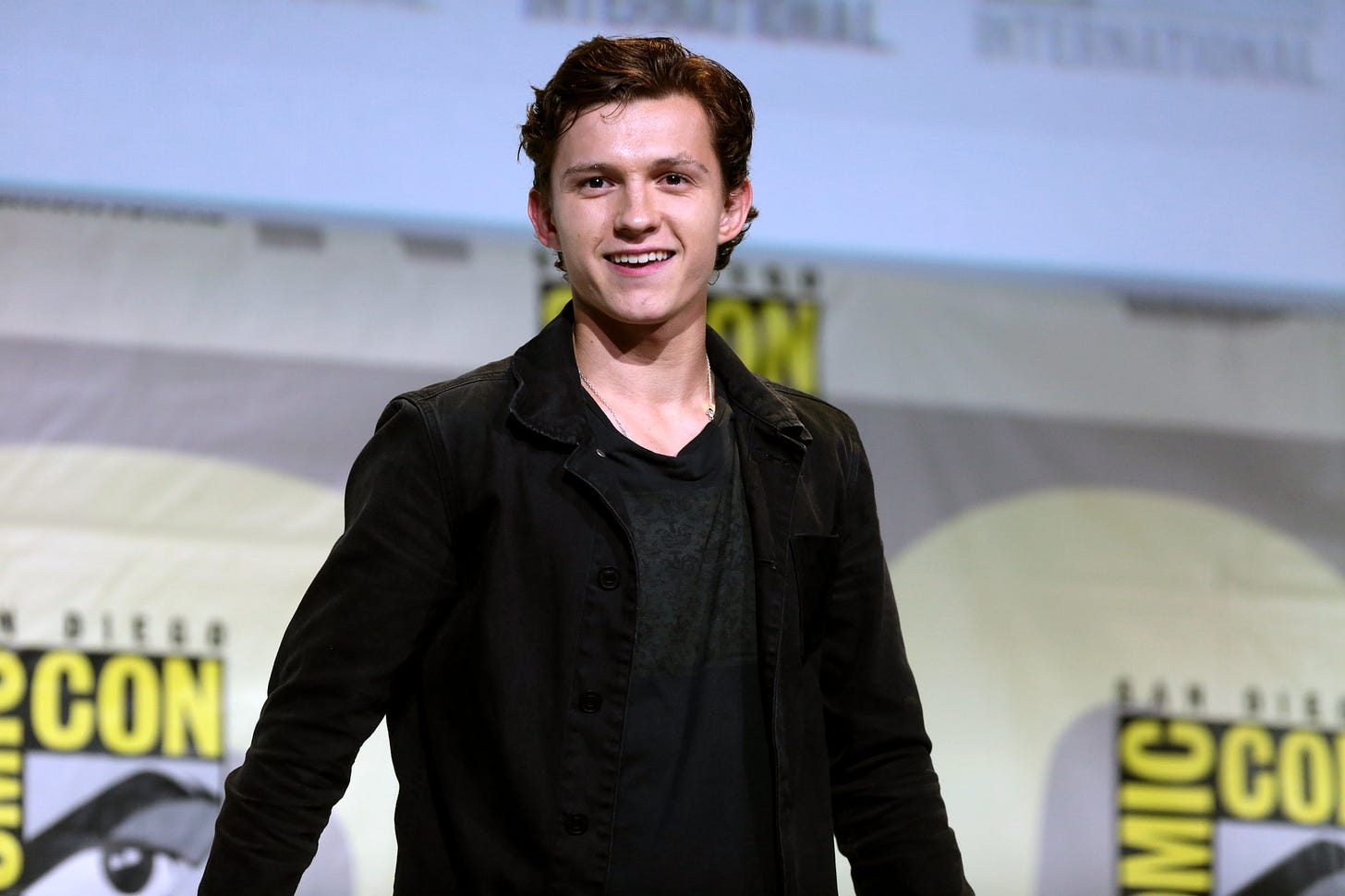Tom Holland Is in Trouble
Holland is one of the biggest stars on the planet, so why are his options so limited?
I admit it’s weird that I care what happens to Tom Holland. He’s rich, famous, good-looking, and talented, and I am not his manager, agent, friend, or acquaintance. I’ve never even met the man. And yet I’m fascinated by him because he’s become one of the biggest movie stars at a time when movie stardom means increasingly little in terms of choices for an actor. On the one hand, Holland is ostensibly the star of the biggest franchise in the world right now (I say “ostensibly” because the IP [Intellectual Property] is really the star; more on that in a bit) — and yet his new movie, Uncharted, is destined for mediocre box office returns (the film overperformed expectations on opening weekend, so it might break even, but for a movie that took 12 years to make and was supposed to start a franchise, that’s not great!).
So why is Holland even starring in an Uncharted movie when he’s not age-appropriate for the role? (Sony decided to age the character down specifically so they could cast Holland and make it an “origin” story, but the true purpose was to ensure they’d have an actor who could play the role for a longer amount of time.) And why is one of the biggest stars in the world “in trouble”? Wouldn’t we all want to be in that kind of trouble where we’re rich and famous and get to hang out with Zendaya?
To answer these questions, I briefly have to explain who is Tom Holland and what is Uncharted. If you already know the answer to these questions, feel free to skip ahead.
Who Is Tom Holland?

You probably best know Holland as Spider-Man. Holland got his first break playing Billy Elliot on stage from 2008 to 2010, and then a bigger break with a terrific supporting turn in the 2012 disaster drama The Impossible. But what catapulted him to the A-list was being cast as Peter Parker/Spider-Man in Captain America: Civil War and then getting to lead a trio of new Spider-Man movies as well as being part of the Marvel Cinematic Universe. Holland rightly won raves for his performance as a younger Peter Parker (previous on-screen versions played by Tobey Maguire and Andrew Garfield tried to get the character away from high school as much as possible), and his success as Spider-Man then allowed him to be courted as the lead in heavy dramas like The Devil All the Time and Cherry as well as doing voice work in family movies like Spies in Disguise and Onward.
What Is Uncharted?
Uncharted is a video game series developed exclusively for Sony PlayStation consoles. It launched in 2007 and followed the globe-trotting adventures of treasure hunter Nathan Drake (voiced by Nolan North). The games stand out because while their gameplay is pretty basic (shooting combat, moving between ledges), they pride themselves on being cinematic. The appeal is that you’re basically playing an Indiana Jones movie with the wise-cracking Drake taking you, the player, along for the ride. Despite all the shooting and combat, the Uncharted series stands apart because the developer, Naughty Dog, put a heavy emphasis on story and character.
Sony Pictures owns the film rights to Uncharted and has been trying to turn it into a movie for quite some time. Way back in 2010, a version was in development with David O. Russell (The Fighter) on board to direct Mark Wahlberg (who had previously worked with Russell on not only The Fighter but also Three Kings and I Heart Huckabees) to star as Drake with possibly Robert De Niro and Joe Pesci signing on to co-star. That version fell apart, and for over a decade, the project moved between different directors including Neil Burger (Limitless), Seth Gordon (Horrible Bosses), Shawn Levy (Free Guy), Dan Trachtenberg (10 Cloverfield Lane), and Travis Knight (Bumblebee) before finally landing on journeyman helmer Ruben Fleischer (Venom). The script also passed through many hands, including The Wibberley’s (National Treasure), Joe Carnahan (The Grey), and Oscar-winner Mark Boal (The Hurt Locker).
In 2017, Sony was so thrilled by Spider-Man: Homecoming that they decided to cast Holland as Drake, a pretty notable departure from the games in which Nathan is a veteran treasure hunter in his mid-to-late 30s. However, the producers wanted to keep the dynamic between Nathan and his mentor/father-figure Sully, which also meant aging that character down as well. Thus they ended up bringing Wahlberg back, but this time to play Sully, and I’m sure he was just thrilled at going from the lead of the movie to the “old guy.” Five years later (the film was originally supposed to open back in 2020 but there was a [checks notes] pandemic), and now Uncharted is here, and it made me consider why Holland would do this movie at all.
A Bad Time to Be a Movie Star
Before I continue: yes, it’s probably “always” a good time to be a movie star because it comes with wealth and fame. But if you look at movie stardom as a matter of having choices, where actors get the widest variety of roles to be seen by the largest audience possible, the present time may be the worst for actors since the studio system of the 1930s-1950s, when studios owned actors’ contracts and held enormous power over their film careers. (Thank the late, great Olivia de Hallivand for shifting that balance of power over to actors).
To look at why things are rough for Tom Holland, let’s look at the early career of another famous Tom. Tom Cruise had some supporting turns in movies like Taps and The Outsiders before breaking out in 1983 with Risky Business. Over the next ten years, his career is surprisingly varied. He gets a blockbuster with Top Gun in 1986, but it’s at a time when the power resides with the star, so while everyone involved wanted to make a sequel, Cruise wasn’t locked into a trilogy deal (also, in something that would never happen today, Top Gun wasn’t based off existing IP). He also stars in a fantasy film (Legend), a frivolous romantic drama (Cocktail), a Martin Scorsese drama (The Color of Money), an Oscar-winning drama (Rain Man), a romantic epic (Far and Away), a play at a Best Actor Oscar (Born on the Fourth of July), a legal drama (A Few Good Men), and a legal thriller (The Firm).
The reason Cruise could have that kind of diversity over a decade is that as a movie star, the power was in his hands. It’s not that every film he made was a hit, but he was enough of a draw to get different kinds of movies made at different price points.
Tom Holland is a star in a much different environment, one which affords him fewer options and gives him less power than previous generations. Holland’s problem is that the studio system right now has a gigantic donut hole of movies that they’ll make. They will either back massive blockbusters based on pre-existing IP, or they will fund serious dramas that may perform at Oscar time.
Because of this massive donut hole, Holland has limited options for the kinds of movies he can make. Now, perhaps he’s thrilled that his choices are IP blockbusters or serious dramas, but I suspect he wants more. In an interview he did with Hot Ones, he said how he wanted to be this generation’s Marty McFly. I seriously doubt he will ever have that opportunity. In this environment, Holland does not get to create a character like Marty — not while he is subject to the IP. He can’t really be Nathan Drake, because he’ll inevitably be compared to the video game version. He can’t even really be Spider-Man, because he will be compared to other Spider-Men.
But to play those “big” roles, that’s where Holland is stuck — because all the film industry’s energy is behind IP, not behind stars. It may be enough to get something like Chaos Walking made if it stars Tom Holland (the star of Spider-Man movies!) and Daisy Ridley (the star of the Star Wars sequels!), but even it hadn’t been released in the middle of a pandemic, I doubt the pairing of these two stars would have generated much interest, because audiences and studios have placed all their emphasis on IP rather than actors. If people were going to show up for Chaos Walking, it was going to be because it was based on a YA novel, not because its lead actors were famous for playing characters in massive franchises.
The Age of IP

It’s understandable why studios are far more comfortable with an age of IP than an age of movie stars. The job of a studio head, more than anything, is to mitigate risk to create the largest return for shareholders. While producers can talk a big game of creating magic at the movie theater and the wonder of ideas, the bottom line is the same. They can’t go into a shareholder meeting and say, “Hey, I’ve decided to spend $100 million on an original idea, but don’t worry because people like Tom Holland.” To even get anywhere close to that pitch for that one movie — it would have to be something like, “Hey, I’ve decided to spend $100 million on an original idea from Christopher Nolan who will be working with the biggest stars Hollywood has to offer,” and even then it’s a harder sell than saying, “I’ve decided to spend $100 million to take a popular kids cartoon from the 90s, and we can spin it off into a bunch of other things.”
That’s why Tom Holland isn’t starring in an original adventure movie. He doesn’t get his Indiana Jones or even his National Treasure. He has to star in Uncharted because even if Uncharted flops, Sony Pictures’ execs can make the case to their shareholders that this was a reasonable investment given the strength of the IP and its further value in selling the Uncharted games. In this mold, Holland is more of a utility player. He’s recognizable enough and audiences that liked him as Spider-Man might be inclined to like him as Nathan Drake. Rather than the draw, Holland is a hedge, and that leaves him in a bad place as an actor because the IP comes first. And maybe this particular scenario was always a losing proposition for Holland because he was so much younger than the character fans (you know, that built-in audience that’s supposed to make IP so appealing in the first place) had come to love. But even if Holland had overcome that hurdle, it’s difficult to say (outside of the studio’s internal research) how many people were showing up for the star and how many were showing up because it’s a movie version of a popular video game.
Holland isn’t the only actor trapped by this narrowing of what can and can’t be a blockbuster. I single him out because if anyone should have options right now, it should be Tom Holland. Of the six highest-grossing movies of all time, Holland is in half of them: Avengers: Infinity War, Avengers: Endgame, and Spider-Man: No Way Home. Of course, Zoe Saldana is also in half of them—the two Avengers movies plus Avatar, but she has fewer options than Holland because if everything is coming downhill of IP, and IP has traditionally made cishet white people their protagonists, then where does that leave her or anyone that doesn’t fit that mold? To put it another way, if Holland’s choices are more limited than previous generations of movie stars, then choices for anyone that isn’t a straight white guy are further reduced.
This is one of the reasons the Age of IP worries me: when there are fewer kinds of movies being made, then there are inherently fewer kinds of roles for actors to do. Marvel can try to argue that their movies are all things to all people, but we know that isn’t true. Spider-Man: Homecoming can be inspired by Ferris Bueller’s Day Off, but it can’t be Ferris Bueller’s Day Off because Ferris doesn’t have to fight a bad guy who uses mechanical wings to fly. No studio would make a John Hughes-style movie today because it’s deemed too small for the marketplace. Turn it into a 10-episode streaming series starring a mostly unknown cast backed by a critically acclaimed writer/director, and then maybe we’ll talk, but can you imagine Tom Holland just getting to play a regular high schooler in a coming-of-age comedy that had no VFX? Holland is one of the biggest stars on the planet, and no one would make that movie for theatrical release.
That’s a larger problem when you see what he can do. I’d argue that Holland’s best performance isn’t in the Spider-Man movies or in The Impossible. It’s this:
That is a man who can dance and (while this is lip-syncing) sing (as Billy Elliot showed) with the best of them, and there’s no room to do that unless someone comes along with a musical that was already a success on Broadway. Sure, you can point to the success of The Greatest Showman, but it took eight years to make that film a reality.
Perhaps the person I feel for in all of this isn’t Holland, but us, the audience. We’re gifted with these new rising talents, and greater diversity than the stars of previous generations. And yet the way the market is right now, these actors have fewer doors available to them. If Tom Holland wants to sing and dance, he’ll have to do it as Fred Astaire because it’s easier to build an awards campaign around a famous person playing another famous person. If he wants to dig into a character for a serious drama, he’ll have to do it in either something like Cherry or the upcoming The Crowded Room, which is a series and is also for Apple. As audience members, we’re not hard up to find entertainment. There’s a deluge. But when it comes to the kinds of movies we’re allowed to get from A-list stars like Tom Holland, his choices have already been mapped out.






Is Zendaya your counterpoint? Look what she did with Malcolm & Marie. If your vantage is just motion pictures not based on existing IP, then we can put aside Euphoria and Dune, but I see no reason to dismiss television out of hand in terms of a star’s options. In todays landscape there’s just as much budget and prestige on the small screen if you’re an actor looking for compelling stories to tell.
I think Holland’s problem is that he doesn’t have an agent helping guide him to the right roles, and for whatever reason he hasn’t taken advantage of chances to make his own smaller, indie stuff. Or jump into a really compelling TV series.
Thankfully, he is a star with plenty of time to make some course corrections, but didn’t he say in an interview he wants to step back for a few years and maybe get married.